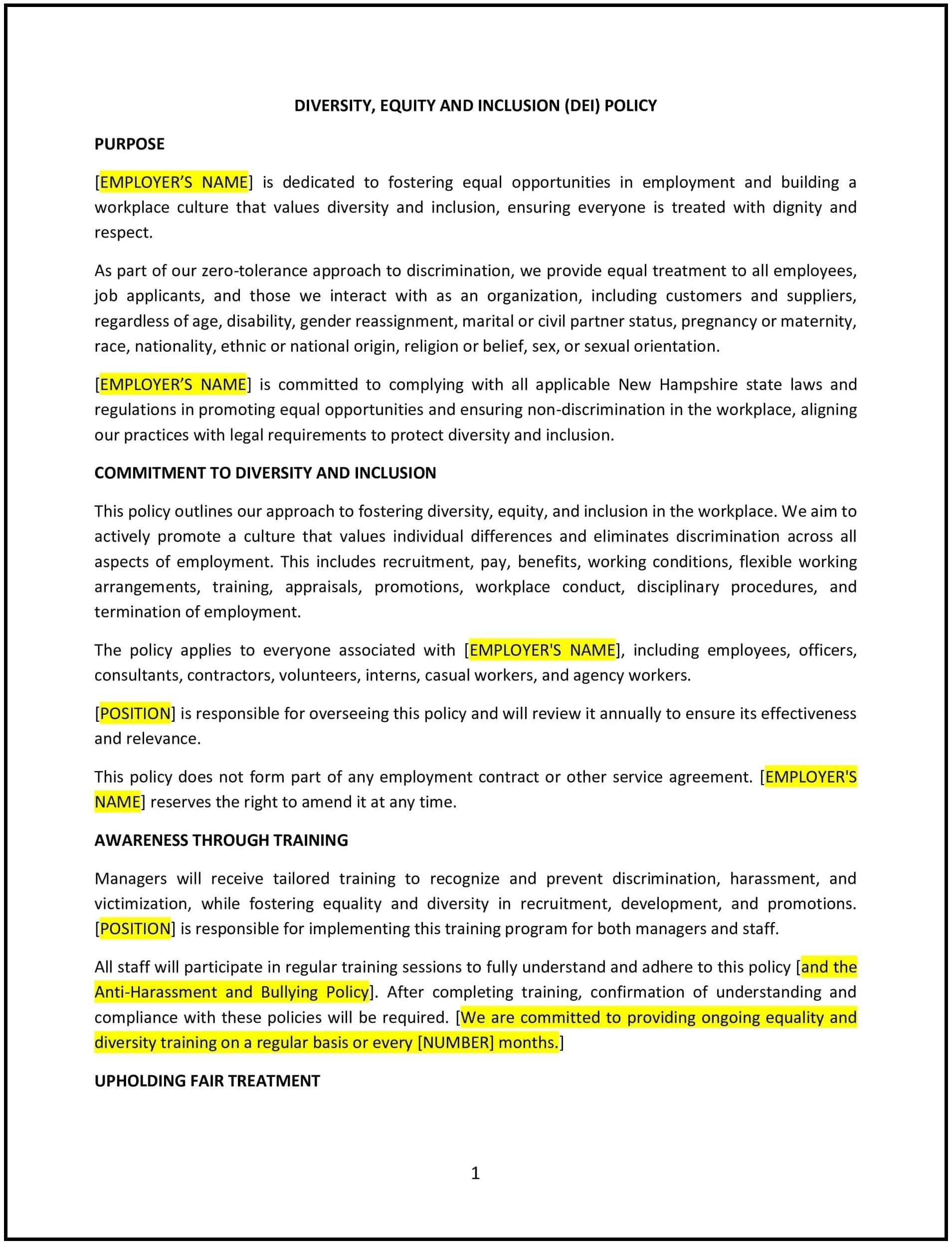Diversity, equity, and inclusion (DEI) policy (New Hampshire): Free template
Got contracts to review? While you're here for policies, let Cobrief make contract review effortless—start your free review now.

Customize this template for free
Diversity, equity, and inclusion (DEI) policy (New Hampshire)
A diversity, equity, and inclusion (DEI) policy helps New Hampshire businesses create a workplace that values diversity, fosters inclusion, and promotes equity for all employees. This policy outlines the company’s commitment to cultivating a diverse workforce, providing equal opportunities, and fostering an environment where all employees feel valued and respected.
By adopting this policy, businesses in New Hampshire can create a more inclusive and productive workplace, improve employee engagement, and build a reputation as an employer of choice for a diverse range of candidates.
How to use this DEI policy (New Hampshire)
- Define diversity, equity, and inclusion: Clearly explain what diversity, equity, and inclusion mean within the context of the company and New Hampshire state regulations, including how these principles relate to hiring, promotions, training, and everyday work practices.
- Set goals and objectives: Establish clear goals for increasing diversity, promoting equity, and fostering an inclusive work environment. Define how the company will measure progress toward achieving these goals.
- Promote inclusive hiring practices: Outline strategies for ensuring fair and equitable recruitment processes, including reaching diverse talent pools, using unbiased interview techniques, and implementing fair compensation practices.
- Provide training and education: Offer regular training for employees and leadership on topics related to diversity, equity, and inclusion, including unconscious bias training, cultural competency, and inclusive communication practices.
- Foster an inclusive culture: Establish a company culture where all employees feel welcome and valued, promoting team-building activities, employee resource groups, and mentoring programs that support diversity and inclusion.
- Address discrimination and harassment: Clearly define unacceptable behaviors related to discrimination, harassment, or exclusion, and outline the process for reporting and addressing such behaviors.
- Implement accountability measures: Hold leadership and employees accountable for fostering an inclusive and equitable environment, including tracking DEI metrics and providing regular reports on the company’s progress.
- Review and update: Regularly review the policy to ensure it aligns with New Hampshire state laws, evolving company practices, and best practices for diversity, equity, and inclusion.
Benefits of using this DEI policy (New Hampshire)
This policy provides several benefits for New Hampshire businesses:
- Promotes a positive work culture: By creating an inclusive environment, businesses can foster a workplace where employees feel respected, supported, and motivated to contribute their best work.
- Attracts diverse talent: A strong DEI policy makes the company an attractive employer for a broader range of candidates, ensuring that the workforce is reflective of the diverse community it serves.
- Enhances employee engagement: Employees who feel valued and included are more likely to be engaged, leading to higher job satisfaction, improved productivity, and better retention rates.
- Reduces legal risks: By promoting fairness, inclusivity, and equal opportunity, businesses can reduce the risk of discrimination claims and legal disputes.
- Improves decision-making and innovation: A diverse and inclusive team brings different perspectives, leading to more creative problem-solving and better decision-making.
- Supports business growth: A diverse workforce can better understand and connect with a broader customer base, driving innovation and business success.
Tips for using this DEI policy (New Hampshire)
- Communicate the policy clearly: Ensure that all employees are aware of the company’s commitment to diversity, equity, and inclusion, and understand their role in fostering an inclusive workplace.
- Make the policy actionable: Break down the DEI goals into actionable steps, ensuring that there are clear responsibilities and accountability measures for everyone in the organization.
- Foster ongoing learning: Provide regular training and development opportunities related to diversity, equity, and inclusion to help employees build awareness and enhance their skills.
- Encourage open dialogue: Create safe spaces for employees to share their experiences and perspectives on diversity and inclusion, and encourage open communication across all levels of the organization.
- Measure progress: Use data and feedback to assess the effectiveness of DEI initiatives and make adjustments as needed to improve outcomes.
- Review the policy regularly: Update the policy annually or whenever there are changes in New Hampshire state laws, business operations, or evolving best practices in diversity, equity, and inclusion.